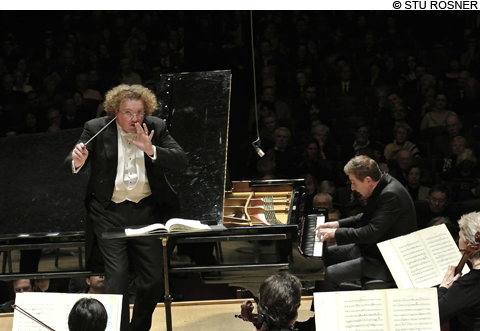
CONDUCTOR ROULETTE: Stéphane Denève made his third appearance with the BSO. |
The last few BSO concerts of the season have had their pleasures and raised some questions, especially about who might be the next BSO music director, one of Boston's — indeed, one of the country's —major cultural positions.
The season gave us three unforgettable concerts, including the second annual program led by British composer Thomas Adès and the enchanting double bill of one-act operas by Stravinsky and Ravel (the poor attendance still has me scratching my head). Nothing else even came near Vladimir Jurowski's thrilling Shostakovich Fourth Symphony, in October.
November began with 47-year-old Spanish conductor Juanjo Mena, chief conductor of the BBC Philharmonic, returning to the BSO in a program encompassing the American premiere of Finnish composer Kaija Saariaho's Circle Map (a BSO co-commission); a rare performance of Benjamin Britten's prescient early Violin Concerto, with Gil Shaham; and Dvorák's Seventh Symphony. The Saariaho featured electronic settings of the gnomic Persian poet Rumi. I was happy to be downstairs, getting the full surround-sound effect, including the refracted voice of Arshia Cont, head of musical research at IRCAM (the famous French institute dedicated to investigating music and science), reading the ancient Persian. Saariaho's elegant atmospherics, however, didn't add up to much more than just that. Shaham was skillful yet oddly unconvincing in the Britten, and Mena's energetic Dvorák finale became the hit of the evening.
A week later, the high point was the most familiar work, Tchaikovsky's First Piano Concerto (which had its world premiere in Boston), with the young Russian Tchaikovsky Competition winner Daniil Trifonov under the returning Costa Rican conductor Giancarlo Guerrero. Trifonov gave the concerto an admirably personal spin, negotiating between grand declamation and interior, spidery contemplation (cellist Martha Babcock's solo in the Andantino was another triumph). The cheers encouraged an encore, Liszt's transcription of Schumann's great song "Widmung" ("Dedication"). Puerto Rican composer Roberto Sierra's colorful Fandangos made a lively Pops-y opening, and Guerrero's heavy-handed Prokofiev Fifth Symphony an oppressive closer.
Thanksgiving week returned pianist-conductor Christian Zacharias to the BSO for a delicious program of smaller-scale rarities. Haydn's consistently surprising 76th Symphony (a BSO premiere!) preceded Mozart's exquisite Piano Concerto No. 18 in B-flat, K. 456 (with Zacharias especially limpid at the keyboard in the poignant loneliness of the Andante), and Beethoven's familiar overture and a selection of much less familiar incidental music from the ballet The Creatures of Prometheus, with its charming un-Beethovenian slow movement with flute and harp and its finale that gives us Beethoven's first (albeit lightweight) use of the theme that became the finale of his Eroica Symphony .
The season concluded with another mainly unfamiliar program (mostly French) led by the French conductor Stéphane Denève, one of the BSO's most frequent recent guests. He started with a bang, the first BSO performance since 1989 of Berlioz's exhilarating early overture (Opus 3 — his first purely orchestral work) to his forgotten first opera, Les francs-juges ("The Free Judges"), an eerie foreshadowing of his Symphonie fantastique. He then supplied supple accompaniment for Jean-Yves Thibaudet in Saint-Saëns's Piano Concerto No. 5, the Egyptian, all conventional prettiness except for its uncanny slow-movement harmonies and echoes of Middle Eastern melismas. The cheering for Thibaudet's effortlessly breathless finale won us an encore, a restrained yet mysteriously moving Debussy "Clair de lune."